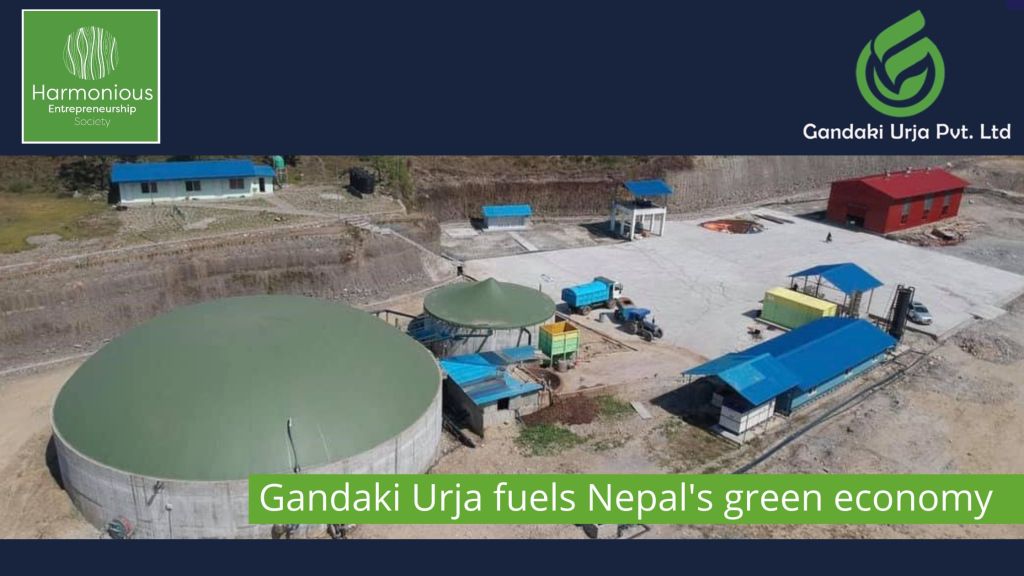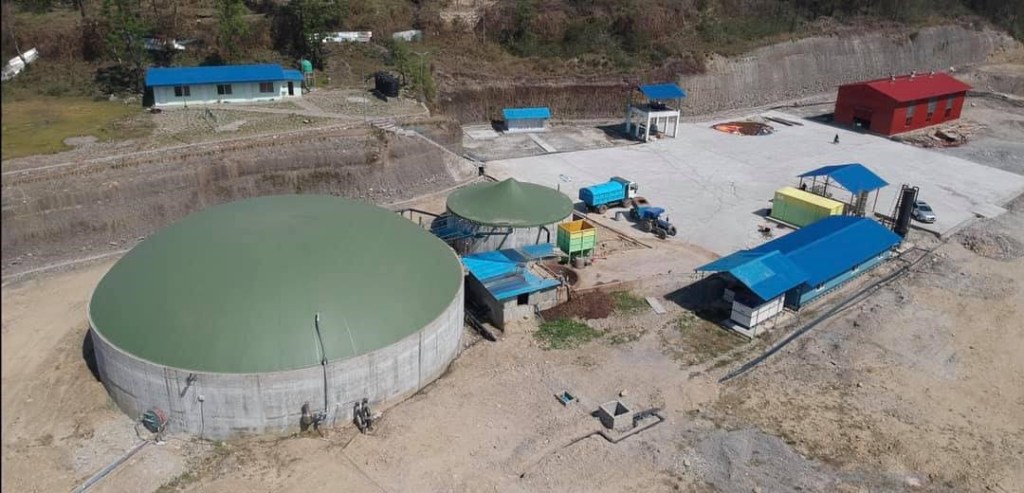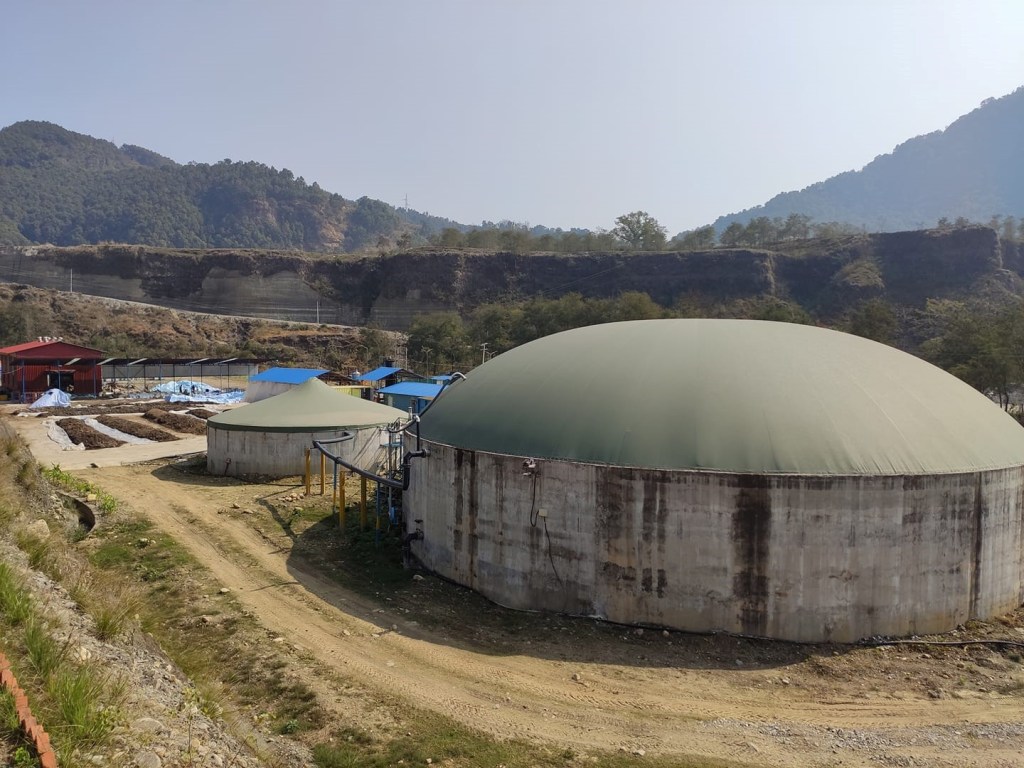
“These are difficult times and we wanted to chip in where we could” – Kushal Gurun.
Kushal Gurung of Nepal is not just a Carbon Management Masters graduate of Edinburgh University, but a serial entrepreneur back home in Nepal. He graduated from Edinburgh in 2009 and in 2012 founded Windpower Nepal Pvt Ltd and Pokhara Himalayan Meats Pvt Ltd. More recently, in 2017, he launched Gandaki Urja Pvt Ltd. This is Nepal’s largest commercial scale biogas plant that each day turns 45 tonnes of organic waste into 1,600 kgs of high quality compressed natural gas and 11,000 kgs of organic fertiliser. This replaces Liquified Petroleum Gas (LPG) and chemical fertiliser, and not only benefits the local economy but helps alleviate the country’s negative balance of payments and its transition to a sustainable energy future.
However, this is not the only objective of Gandaki Urja Pvt. Located in the foothills of the Annapurna mountain range, the project aims to conserve the fragile mountain ecosystems and support the region’s mountain communities. It does this by managing the organic waste and replacing fossil fuels and chemical fertilisers. Apart from generating energy, the project reduces the emissions from animal and municipal waste, helping reduce methane gas emissions while the use of organic fertiliser helps prevent soil and water pollution and improves the health and sanitation of the local people. In addition to providing employment for the local people and helping upskill the workforce, the project also helps other local businesses, such as shops and restaurants, to flourish.
By 2020, the plant was distributing Compressed Natural Gas (bio-CNG) to customers in Pokhara where it is located and received a $413,000 investment from Nepal’s first private equity fund. Confidence was high, and the management had plans for further expansion. Then came the COVID-19 pandemic. Many of the venture’s clients were forced to close and the business itself was on the brink of closure when one of the largest medical facilities in Nepal, that was treating COVID-19 patients, asked Gandaki Urja to supply them with gas as they were struggling to procure it for cooking. Although it did not make sense commercially, Kushal “decided to respond to the call from the hospital as they were at the frontline of the fight against the virus”. The news spread, and other hospitals requested supplies, a new market opening up, not least as customers found they could save up to 30% on LPG as it has a higher calorific value.
Changing the business plan to meet the changed market conditions and the demands of new customers was done at a cost. Some of the funding earmarked for expansion had to be used to keep the venture running, but despite the new customers, the business remains heavily dependent on the farming community. They not only supply the livestock and farm waste but increasingly depend on Gandaki Urja as imported chemical fertilisers are in short supply. Kushal has not forgotten them or the firm’s community mission.


While addressing SDGs 13 (Climate Action) and 15 (Life on Land), Gandaki Urja is also concerned to address SDGs 11(Sustainable Cities and Communities) and 12 (Responsible Consumption and Production) as well as 7 (Affordable and Clean Energy) and 8 (Decent Work and Economic Growth), plus 6 (Clean Water and Sanitation) and 3 (Good Health and well-being). Kushal is clearly not just concerned with “making as much money as possible”. Though he recognises the need for the venture to make money he recognises, also, that it has a responsibility to both the environment and the people. Hence he has created a sustainable enterprise in which profit, planet and people are in harmony.
© Harmonious-Entrepreneurship.org (2020-2022). Unauthorized use and/or duplication of this material without express and written permission from the author is strictly prohibited. Excerpts and links may be used, provided that full and clear credit is given to Harmonious-Entrepreneurship.org with appropriate and specific direction to the original content.


Thanks for sharing this example of a real entrepreneur in a country which has one of the highest levels of poverty and isolation in the World. It is disappointing that anaerobic digestors/reactors are not more widely used to generate energy, as well as addressing the issue of waste products which otherwise would be contaminating rivers/land. The old adage “necessity is the mother of invention..” rings true here and I wish the principal, Kashal Gurung, every success and a sustainable future for his ventures.
LikeLike
Hi Thanks, just commented. Interesting case study and took me back to a previous Lampeter Graduate Enterprise Programme when one of the students wanted to set up a company installing anaerobic digesters/reactors in rural areas. She was a science graduate who had carried out extensive research into how isolated villages in China used this type of energy generation. I wonder where she is now – it was one of those ventures which was before it’s time and and needed patient capital/long term investment to get it off the ground. One of the reasons why it would be interesting to follow the successes, or failures, of HES business competition students over many years as a longitudinal study. Regards Bev
LikeLike